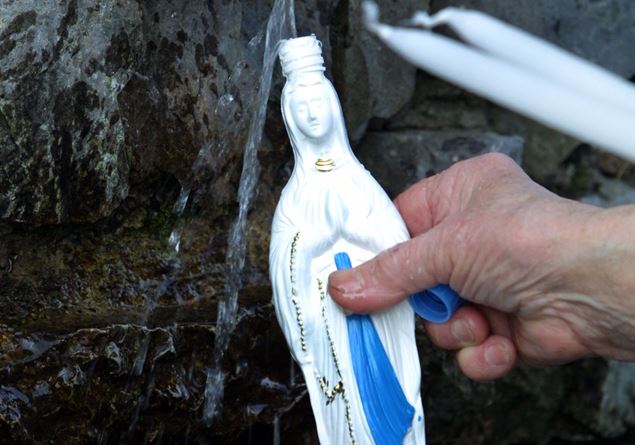A stop to the most discussed Marian titles, because only Christ is Mediator and Redeemer. The Note “Mater Populi fidelis”, on some Marian titles referring to Mary’s cooperation in the work of salvation, published by the Dicastery for the Doctrine of the Faith, seeks to combine devotion and theological rigor. Save the dMarian evocation, “which is a treasure for the Church”explains Cardinal Víctor Manuel Fernández, prefect of the Dicastery for the Doctrine of the Faith, when presenting the document, but asks that it not be “distorted or manipulated”.
The text, approved by Pope Leo last October 7, is the result of over thirty years of studies and discussions and responds «to numerous questions and proposals received by the Holy See in recent decades, in particular on some Marian titles” aiming to “clarify in what sense they are acceptable or not” and specifying “the place of Mary in her relationship with the faithful, in light of the mystery of Christ as the only Mediator and Redeemer”.
Precisely to explain the subordinate role of Mary to Christ in the work of Redemption, the Note declares that «it is always inappropriate to use the title of Coredemptrix to define Mary’s cooperation. This title risks obscuring the only saving mediation of Christ and, therefore, can generate confusion and imbalance in the harmony of the truths of the Christian faith, because “in no one else is there salvation; in fact, there is no other name under heaven given to men, by which it is established that we are saved”. When an expression requires numerous and continuous explanations, to avoid it straying from the correct meaning, it does not serve the faith of the People of God and becomes inappropriate. In this case, it does not help to exalt Mary as the first and greatest collaborator in the work of Redemption and grace, because the danger of obscuring the exclusive role of Jesus Christ, the Son of God made man for our salvation, the only one capable of offering the Father a sacrifice of infinite value, would not constitute a true honor to the Mother”.
In the document the Dicastery also clarifies that «no human person, not even the Apostles or the Holy Virgin, can act as a universal dispenser of grace. Only God can give grace and he does so through the humanity of Christ, since “Christ-Man holds the fullness of grace as the only begotten of the Father”. Although the Blessed Virgin Mary is eminently ”full of grace” and ”Mother of God”, she herself, like us, is the adopted daughter of the Father and also, as the poet Dante Alighieri writes, ‘daughter of your Son'”.
For this reason the Dicastery also holds back on title of Mediatrix because «any expression regarding her ”mediation” of grace must be understood in remote analogy with Christ and his unique mediation. In the perfect immediacy between a human being and God, in the communication of grace, not even Mary can intervene. Neither friendship with Jesus Christ nor the Trinitarian indwelling can be conceived as something that comes to us through Mary or the saints. In any case, what we can say is that Mary desires this good for us and asks for it together with us.”
The purpose of the Note, therefore, is to purify popular piety by indicating which titles respond to a Marian devotion inspired by the Gospel and which “must be avoided, because they do not favor an adequate understanding of the harmony of the Christian message as a whole”
«It is not a question of correcting the piety of God’s faithful people, who rediscovers refuge, strength, tenderness and hope in Mary, and above all to enhance her, recognize her beauty and promote her”, underlines the cardinal. But to clarify why «there are some Marian reflection groups, publications, new forms of devotion and requests for Marian dogmas which do not present the same characteristics of popular devotion but which, ultimately, propose a certain dogmatic development and are expressed intensely through media platforms, frequently awakening doubts in the simplest faithful».
The text specifies that “multitudes of believing brothers and sisters spontaneously recognize Mary as Mother”, we read in the text. Pilgrimages to Marian sanctuaries are considered moments of “consolation and spiritual renewal” where believers receive “the caress of the Mother” which relieves them from daily hardships. Indeed, the very “decision to set out towards the sanctuary is already a confession of faith”. Popular piety is presented as a value, a “living expression of the closeness of the Mother”. However, great prudence is needed on the part of pastors, especially with regard to some titles attributed by a certain devotion to Mary and which can cause confusion. Furthermore, the Dicastery also recalls, as it had done previously, that «in the case of alleged supernatural phenomena, which have already received a positive judgment from the Church, where some of the expressions or titles such as those mentioned above occur, it must be taken into account that, in the event that a nihil obstat is granted by the Dicastery, such phenomena do not become an object of faith – that is the faithful are not obliged to give their assent of faith.”
Finally, the Note specifies that “what has been said does not offend or humiliate Mary, because her whole being refers to her Lord”. And indeed, ««a look directed at her that would distract us from Christ, or put her on the same level as the Son of God, would be foreign to the dynamics of an authentically Marian faith».


